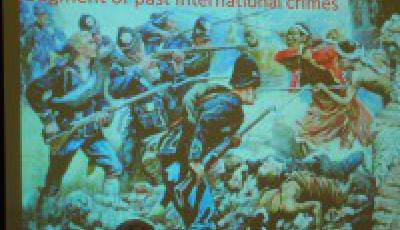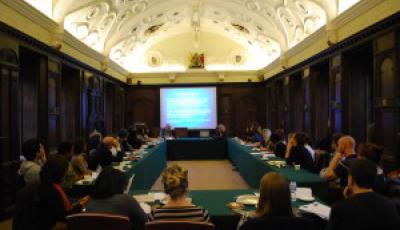Looking at Past Crimes: When do ‘Rolling Heads’ and Bloodletting Become Funny?
Posted:
Time to read:

Professor Willem De Haan from the University of Amsterdam invited students and staff of the Oxford Centre for Criminology to think about these questions in his talk ‘Knowing what we know now: International crimes in historical perspective’ at All Souls College on 15 October 2014.

Even young, beautiful women with infants on the arm took part in the fight, throwing pieces of lead from the roofs (…). Fortunately, my troops stood like a wall. After the eight attack only a few remained, who were asking for mercy, I think 13. The soldiers looked at me questioningly. Thirty of my own men had been killed or wounded. I turned away in order to light a cigar. A few heart rendering cries were heard and when I turned again these 13 were also dead.
Professor De Haan encouraged us to consider this event through two lenses: the normative lens and the transitional justice lens.
The normative lens: Should we judge past atrocities in terms of contemporary morality?
Should we condemn Lieutenant Colijn as a ‘war criminal’ or rather see him as ‘a child of his time’? In the discussion after the talk some people in the audience argued that we should not conflate legal and moral terminology when we judge the past. The concept of a ‘war crime’ that is punishable by international criminal courts and tribunals is a fairly recent concept. It is clear that neither Lieutenant Colijn nor his contemporaries made sense of his acts as ‘war crimes’ in a legal sense. Rather than appearing before an international criminal court, Lieutenant Colijn received military honors for his colonial campaigns and even became Prime Minister later in his life (actually not such an uncommon career for contemporary war criminals either). Legally speaking, it does not seem to add much to say that Lieutenant Colijn’s atrocities would be considered as ‘war crimes’ nowadays.
But when we call people ‘war criminals’ or ‘génocidaires,’ we often use these terms to express strong moral outrage rather than as legal classifications. I remember reading a paper by a legal scholar who complained that it is inaccurate to call Tony Blair a ‘war criminal’ for his role in the invasion of Iraq in 2003. More likely, he was guilty of the crime of aggression. But it seems to me that this scholar missed the point. People call Tony Blair a ‘war criminal’ not because they necessarily believe that he is guilty of this particular international crime but because the term has become a ‘label’ that communicates strong moral outrage in public discourse. But do we feel the same moral outrage regarding atrocities that occurred more than 100 years ago?
The transitional justice lens: How do we relate to past atrocities?
Indeed, do historical crimes still matter to us? In this context, Professor De Haan invoked the concept of ‘transitional justice.’ ‘Transitional justice’ refers to ‘the set of judicial and non-judicial measures that have been implemented by different countries in order to redress the legacies of massive human rights abuses. These measures include criminal prosecutions, truth commissions, reparation programs, and various kinds of institutional reforms.’ The transitional justice literature and practice predominantly claim that post-conflict societies have to deal with past crimes to overcome ‘national trauma’, to achieve ‘justice for victims’ and to foster ‘national reconciliation’. While transitional justice has recently become a wide and blurry concept, conventionally, it was used to study how states transition from mass violence to a state of peace and democracy. How did Rwanda deal with its genocide? How did South Africans learn to live with each other after Apartheid? The concern was with the recent rather than the distant past.
But what about the Dutch atrocities committed in the Dutch East Indies in the late 19th century? Should we care about them in terms of ‘historical justice’? Professor De Haan suggests that we should or already do. He points to the principle of ‘legal imprescriptibility’ and the ‘right to truth’ that have been developed by the United Nations (UN) since the 1960s to back up this claim. The principle of legal imprescritibility ensures that persons who committed genocide, crimes against humanity and war crimes can be prosecuted without any time restrictions. At the same time, victims have been granted the right to know the full truth of what happened to them and their loved ones. But does it make sense to have a right to truth for crimes whose perpetrators and victims have long been dead as is the case with the crimes of Lieutenant Colijn and his men? Interestingly, the Dutch government in September 2013 formally apologized for the mass killings of Indonesians during the colonial occupation. Yet, the apology referred to crimes committed by the Dutch between 1945 and 1949, but not to crimes committed in the late 19th century.

Share:
